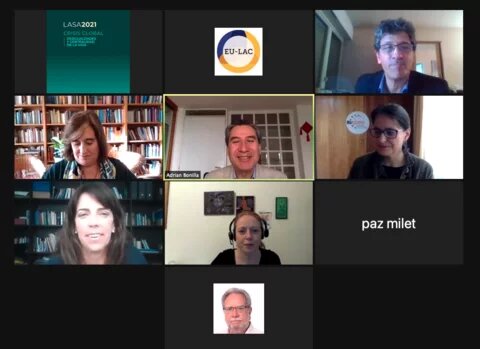Due to the COVID-19 pandemic, this year's LASA Congress, which focused on the theme "Global Crisis, Inequalities and the Centrality of Life", was held virtually from 26-29 May. The EU-LAC Foundation was represented at the Congress by its Executive Director, Dr Adrián Bonilla.
On May 27th, Dr Adrián Bonilla participated as a commentator on the panel "The New EU- LAC Interregional and Bilateral Agenda", sponsored by the Europe-Latin America Section of LASA, which addressed issues ranging from human security (Ana Ayuso, CIDOB), the European Union-Cuba Agreement (Jose Chofre, University of Alicante), food sovereignty (Elisa Botella-Rodríguez, University of Salamanca), EU-MERCOSUR cooperation (Raúl Bernal Meza, Arturo Prat University) and scenarios for transforming the bi-regional strategic relationship (Carlos Quenan, Sorbonne Nouvelle University). In this panel, Dr Bonilla stressed that the bi-regional partnership is not reduced to a political link between the two regions, but that it is constituted by a broad network of relations between countries, institutions, civil organisations, and individuals in a wide range of dimensions (culture, education, trade...).
On 28 May, Dr Adrián Bonilla coordinated the panel "Regional and interregional responses in Europe and Latin America to the gaps after the pandemic", sponsored by the Europe- Latin America Section of LASA, which analysed the measures implemented by countries and regional organisations in Latin America and the Caribbean and the European Union to mitigate the health, social, economic and political effects of COVID-19. The speakers in this panel included Lorena Granja Hernández (PPGRI-UERJ), Alan Fairlie Reinoso (Pontifical Catholic University of Perú), Yadira Gálvez and Alejandro Chanona (National Autonomous University of México), Pedro Caldentey del Pozo and Olga Pozo (Universidad Loyola Andalucía), Jorge Damián D. Rodríguez Díaz (University of the Republic, Montevideo), as well as Ana Ayuso (CIDOB) - in the role of commentator.
Given the weak response capacity and extremely limited fiscal margins of Latin American and Caribbean governments, the measures coordinated at the level of SICA, CAN, UNASUR, the Pacific Alliance and MERCOSUR revolved around the provision of evidence-based information on the pandemic, the circulation of medical products and hygiene articles, the facilitation of trade and the non-interruption of value chains, among others. In addition, the important proposals generated at the ECLAC level in favour of the generation of integration processes, productive transformation and technological development were highlighted, as well as the need to strengthen the region's voice at the multilateral level, in order to generate greater resilience to systemic shocks of this nature in the future.
Lastly, on 28 May, the EU-LAC Foundation hosted the panel "Multilateralism and the EU- CELAC Partnership in the face of the pandemic", which addressed the status quo of bi-regional relations in the global political scenario and the opportunities to strengthen them, based on common interests and needs, in favour of a sustainable recovery and the fulfilment of the 2030 Development Goals. Dr Adrián Bonilla (EU-LAC Foundation), Merike Blofield (GIGA Hamburg, University of Miami), Elsa Llenderrozas (University of Buenos Aires), Paulina Astroza (University of Concepción), and María Victoria Álvarez (National University of Rosario), as well as Carlos Quenan (Sorbonne Nouvelle University) in the role of commentator, contributed to this dialogue with a presentation. The speakers converged around the need for strong political leadership, a solid institutional framework for regional articulation and a more pragmatic approach to join forces in the search for viable solutions to challenges such as climate change, digital transformation, social and economic inequalities and the fulfilment of human rights.
In light of the above, the LASA 2021 Congress was successfully held virtually from 26-29 May, with massive participation of academics from all continents. The Latin American Studies Association (LASA) is the world's largest professional association for individuals and institutions dedicated to the study of Latin America, with more than 13,000 members.

